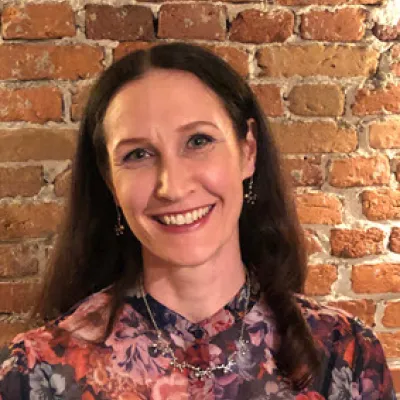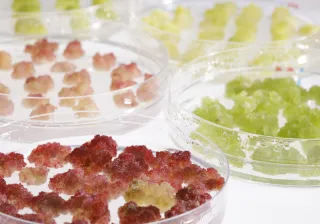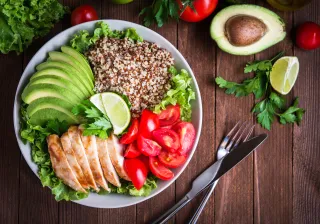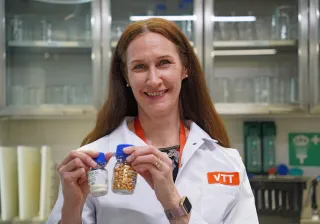Solar Foods is a Finnish food tech startup that has created a way to produce a new, natural source of protein just out of air and electricity. What started as a research project carried out by VTT Technical Research Centre of Finland and LUT University has now grown into a successful start-up with more than 20 employees. Solar Foods has set itself an ambitious target: to revolutionise food production and help solve world hunger and the environmental problems caused by agricultural practices.
The nature of farming has not changed much since the dawn of agriculture. It still relies heavily on natural resources: the climate, soil, water and energy. As a result, our current way of producing food is responsible for one third of the emissions that cause climate change. On top of that, livestock is now the world’s largest user of land resources, occupying around 40 percent of habitable land.
To Solar Foods’ CEO Pasi Vainikka, it was apparent that a radical change was needed.
Changing the way food is produced
“We want to disconnect food production from agriculture. That is our gift to the world,” says Vainikka.
Solar Foods has developed a way to produce a nutrient-rich protein called Solein by using fermentation, air and electricity. As nearly all the raw materials are obtained from the air, Solein can be produced basically everywhere, even in arid deserts and fallow fields. In fact, Solar Foods aims to be the first company to introduce to the market food that is produced without agriculture and fossil fuels.
“We want to break free from the limitations of traditional raw materials and ways of producing food. This way we’ll use less land and create less greenhouse gases,” explains Vainikka.
Solein: natural, versatile and climate friendly
Even though Solein is not grown the traditional way, it’s a completely natural protein – there’s nothing artificial about it.
Just like wheat flour, Solein is a powder. It can be used as a protein ingredient to make an array of different foods: alternatives to meat, soft cheese and dairy-free yoghurt. It can also be used to nutritionally upgrade bread, pasta, drinks, snacks and in-between meals. It has hardly any taste, so it vanishes easily into daily meals.
And the best part about Solein – its environmental impact is about 10% of that of most plant-based proteins and about 1% of meat’s.
Solar Foods’ roots lie in long-term scientific research
The story of Solar Foods and Solein is built on years of research and practice. In 2014, VTT Technical Research Centre of Finland and LUT University joined forces to produce emission-free solutions based on renewable energy.
The reception was very excited when the research teams announced in 2017 that they had succeeded in producing protein from air and electricity.
“The findings of the project attracted a lot of media interest, and we immediately knew we had something special on our hands,” says Vainikka. “We had a proof of concept and felt confident we could commercialise the solution,” he continues.
According to Vainikka, the company that now creates “living magic” has its roots firmly in the rich and fertile soil of VTT. “VTT provided us with the foundation upon which we build our success. They gave us the opportunity and the framework to create a successful proof of concept and turned us into experts at what we do.”
The fact that all Solar Foods’ key players have a background as scientists is also a great advantage: “We work based on facts. If the facts change, we will adjust our course,” explains Vainikka.
Creating a better future with the help of science
Vainikka believes that knowledge, science and research are the only ways to change the world. And that at the heart of that change lies cooperation.
“Surprising, disrupting solutions arise from the intersection of scientific disciplines. In the case of Solar Foods, the ground-breaking intersection was at VTT, where Juha-Pekka Pitkänen, who has a PhD in bioprocess engineering, and I met. My background is in renewable energy systems.
Vainikka sees that there’s a real demand for science-based innovations such as Solein.
“With all that is happening with the climate and the environment, investors and the general public are hungry for positive news for a change. We are seen as a positive counterforce,” says Vainikka.
The first harvest of food from thin air to hit the shelves in 2023
Solar Foods’ story so far has been typified by fearlessness and the desire to try something different. The company is driven by possibilism and the believe that technology will open new doors to the future and make things possible.
So, what is next on the horizon for the innovative start-up?
”First, a commercial factory in 2023 and then scaling-up. The first factory, called Factory 01, is already under construction. We have also applied for a novel food authorisation to introduce Solein to the food market in the EU and internationally. You should expect to see our products available on shop shelves in 2023,” Vainikka says.







